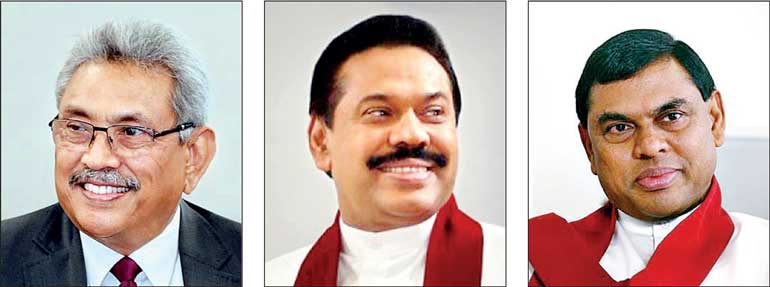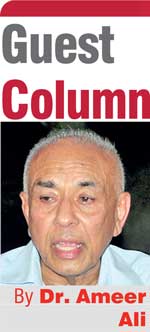Sunday Apr 27, 2025
Sunday Apr 27, 2025
Thursday, 9 December 2021 00:00 - - {{hitsCtrl.values.hits}}

No government in memory had done so much damage to the economy and in so short a time as the current Rajapaksa Government
 Never in the history of independent Sri Lanka has the economy recached such a low point as it is now. Will this be its nadir or is it yet to arrive? With just $ 1.5 billion foreign reserves in stock of which $ 300 million is gold, the country without any fresh injections into that stock, would go financially bankrupt after paying for four weeks of imports.
Never in the history of independent Sri Lanka has the economy recached such a low point as it is now. Will this be its nadir or is it yet to arrive? With just $ 1.5 billion foreign reserves in stock of which $ 300 million is gold, the country without any fresh injections into that stock, would go financially bankrupt after paying for four weeks of imports.
With no funds to pay for fuel imports, the price of which is on the rise, home cooking would soon become a luxury for many, and with unavoidable and incessant power cuts the nation will literally plunge into an era of darkness. In short, no government in memory had done so much damage to the economy and in so short a time as the current Rajapaksa Government.
True, the pandemic was one factor that contributed to this disaster, but it did not originate it. Even without the pandemic economic decay would have set in in the hands of a political leadership that is ideologically wedded to a historically manufactured ethno-national supremacist ideology with its majoritarian political appurtenances.
Scarcity of foreign exchange is frantically chasing the three Rajapaksas GR, MR and BR to run around looking for lenders among friendly governments and their central banks for loans and currency swaps. They and the chief of CBSL are quite adamant that IMF with its conditional lending is best to be avoided in order to succeed with their homegrown experiment in or alternative path for development.
People were made to believe that the President had determined to push the nation towards ‘prosperity and splendour’ within a ‘disciplined, virtuous and lawful’ society. Slogans remain slogans unless they are translated into pragmatic policies and action. In this, the record of this regime over the last two years had been an abysmal failure, which the President himself has admitted publicly. When the young and educated lose hope in their future they either migrate to a greener pasture or remain at home seething with discontent. Both signs are visible at present.
However, in one area there had been a flurry of activities. The regime came to power with a determination to make Sri Lanka a supremacist Theravada Sinhala-Buddhist state. From the day GR took his oath of allegiance in the Buddhist precincts of Ruwanweliseya in Anuradhapura in 2019 to MR’s unveiling of Sauda Hiru Seya in the same area just a few days ago their efforts to translate that determination into reality were quite open and elaborate, and at times disturbing.
The President’s regular sessions with Buddhist prelates in his office to the exclusion of other religious leaders, his appointment of a Task Force headed more by Buddhist monks and Buddhist chauvinists than trained and qualified archaeologists to identify, excavate and protect Buddhist ruins, his callous disregard to the sentiments of members of other religions when their religious precincts were sacrilegiously treated by Buddhist monks and security officers such as what happened in a Hindu temple in Mullaitivu and the mosque in Mahara respectively, arbitrarily relaxing pandemic lockdown rules during days of Buddhist festivals and peraheras, choice of a cantankerous monk to chair the One Country One Law Task Force, and the appointment of Buddhist monks with questionable ability as Chancellors of universities are glaring illustrations to prove the point.
In essence, with luxury vehicles and other privileges provided to the Mahanayakas the current regime has virtually made the Sangha another parastatal. What happened to the principles of simplicity and abstinence from luxuries preached by the Buddha?
The constitution has already granted foremost place to Buddhism, but still there is a powerful section within the Buddhist community that demands Buddhism to be the state religion. The nation is anxiously waiting to see the draft of the new constitution. All in all, it appears that the Rajapaksas and their power cartel believe that as long as Sinhala-Buddhists remain hallucinated with doses of ethno-religious narcotic the durability of the regime would remain solid.
It is doubtful whether any of the existing opposition parties including JVP/NPP has the guts to take a contrary position on the issue of Buddhism’s political supremacy. The one who had the resolve to speak out along this line was the late Mangala Samaraweera, and how he was chastised by members of the Sangha for his outspokenness is public knowledge.
Politicisation of Buddhism in independent Sri Lanka precedes the Rajapaksa regime by several decades. In fact, it goes back to the 1950s when monks from Vidyalankara Privena addressed voters from the campaign platforms of leftist parties to the chagrin of UNP leaders. However, the political value and strength of Buddhism was cleverly utilised by SWRD in 1956. Surprisingly, it was from his campaign that even the CIA was said to have learnt to instrumentalise Buddhism in the American war against communism in Southeast Asia. What began in 1950s snowballed in every election since then and once again produced victory for Rajapaksa chauvinists in 2019.
The argument here is not against Buddhism but against its politicisation. In fact, politicisation of any religion is detrimental to the mundane life of any society and particularly of plural societies. Europe and the West realised this truth long ago and kept the state and Church separate. Singapore was born with a secular model. Both are prospering. There is no way to find unity in diversity when one component of that plurality is treated more preferentially than others by the state. When the social foundation is cracking with divisions and discrimination how could the super structure built on it remain stable?
Basically, an economy is built by the people for the people. It is the synergy produced by their total effort that enables the economy to reach its full potential. Other inputs enumerated in textbooks are all secondary. The effort of people is the primary input. When one-third of the population is treated by the state less equally than the other two-third and therefore remain frustrated, uncommitted and un-cooperative with the state’s call for development, the volume of synergy produced in that economy would obviously be suboptimal.
There may be periodic affluence at times due to certain fortuitous circumstances but sustained growth at optimum level is not possible. How then could one expect the economy to deliver prosperity and splendour? Under the current regime even its favoured two-third has begun to lose hope in its economic future. It is therefore the contention of this essay that even if the world outside were to recover from the current depression Sri Lanka would remain crisis ridden. The real seeds of economic crisis are elsewhere and buried in the country’s socio-political foundation. A new secular constitution and privatisation of religion therefore become indispensable to stop the rot, restore democracy and revive economic development.
(The writer is attached to the School of Business and Governance, Murdoch University, Western Australia.)
Discover Kapruka, the leading online shopping platform in Sri Lanka, where you can conveniently send Gifts and Flowers to your loved ones for any event including Valentine ’s Day. Explore a wide range of popular Shopping Categories on Kapruka, including Toys, Groceries, Electronics, Birthday Cakes, Fruits, Chocolates, Flower Bouquets, Clothing, Watches, Lingerie, Gift Sets and Jewellery. Also if you’re interested in selling with Kapruka, Partner Central by Kapruka is the best solution to start with. Moreover, through Kapruka Global Shop, you can also enjoy the convenience of purchasing products from renowned platforms like Amazon and eBay and have them delivered to Sri Lanka.
Discover Kapruka, the leading online shopping platform in Sri Lanka, where you can conveniently send Gifts and Flowers to your loved ones for any event including Valentine ’s Day. Explore a wide range of popular Shopping Categories on Kapruka, including Toys, Groceries, Electronics, Birthday Cakes, Fruits, Chocolates, Flower Bouquets, Clothing, Watches, Lingerie, Gift Sets and Jewellery. Also if you’re interested in selling with Kapruka, Partner Central by Kapruka is the best solution to start with. Moreover, through Kapruka Global Shop, you can also enjoy the convenience of purchasing products from renowned platforms like Amazon and eBay and have them delivered to Sri Lanka.